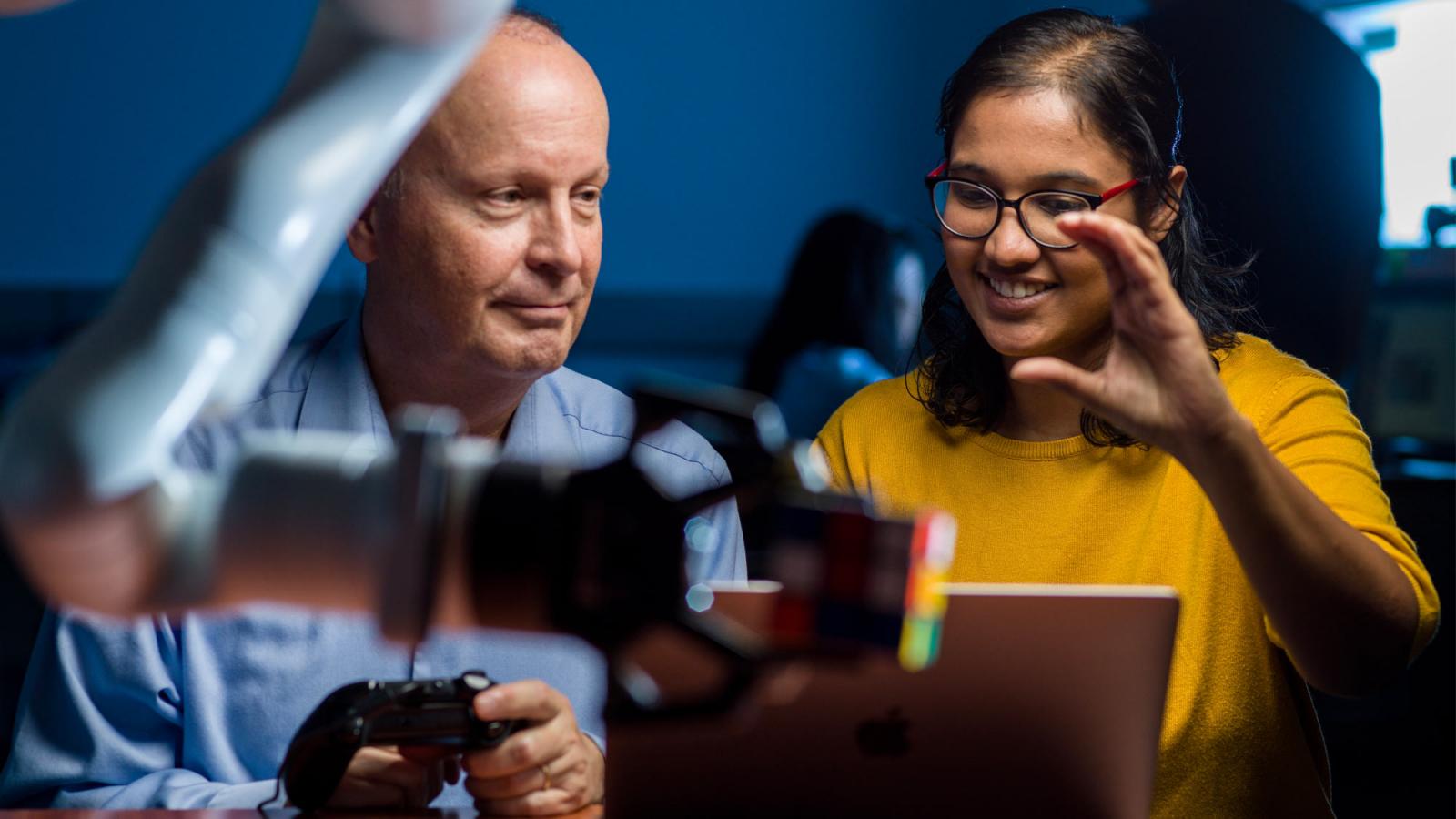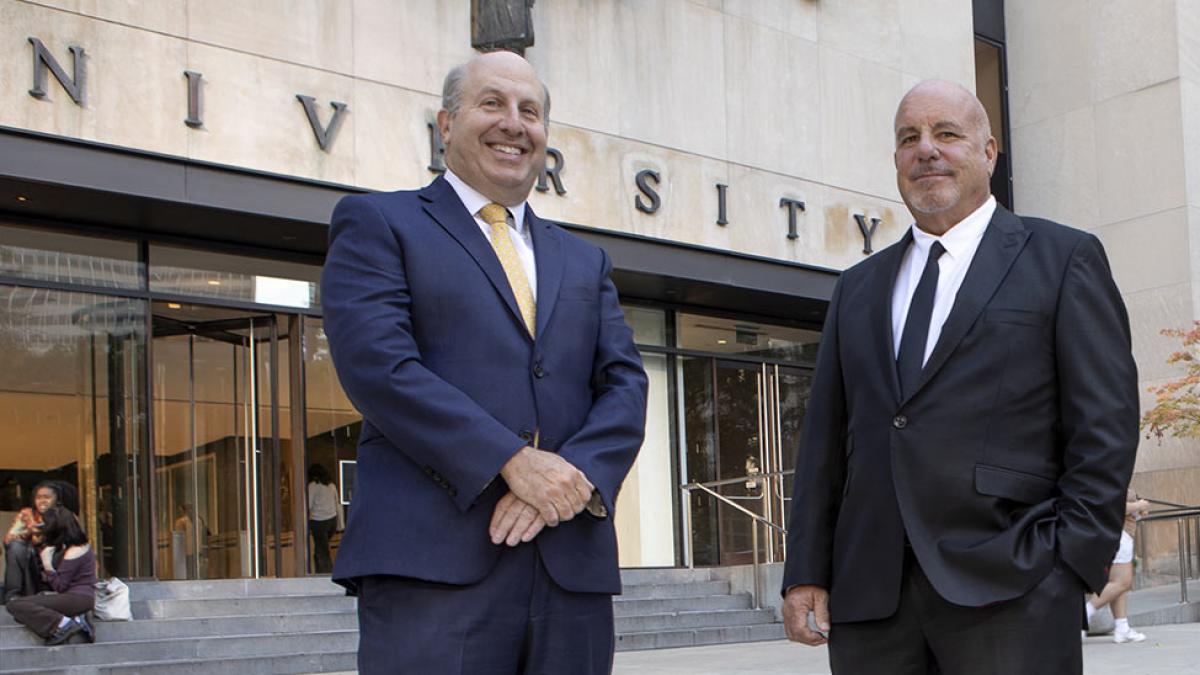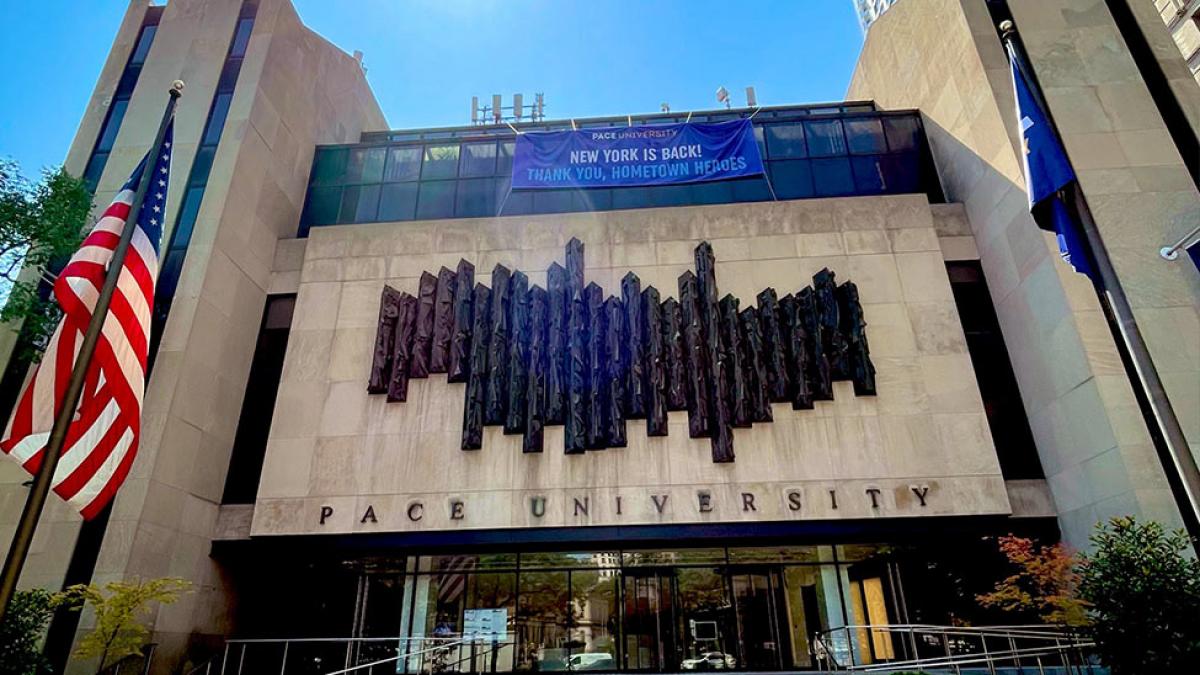In spite of the pandemic, Pace is marching ahead. With the continued transformation of the NYC Campus, new interdisciplinary academic programs, and a bright look to the future, Pace continues to thrive.
Pace Forward

In 1906, Homer and Charles Pace rented a single classroom to teach 13 men and women accounting and business. One hundred and fifteen years later, Pace is a dramatically different place; instead of 13 students, Pace University now boasts over 13,000; who come from all over the world and will go on to excel in careers ranging from nursing to computer science and nearly everything in between. Instead of a single classroom, there are now two vibrant undergraduate campuses and a law school campus—with ever-improving state-of-the-art facilities that have strategically positioned Pace as one of the New York metropolitan area’s most future-thinking institutions of higher learning. And while our committed faculty and staff steadfastly abide by Pace’s longstanding mission of Opportunitas—cultivating opportunity to transform lives—our diverse faculty and staff bring the know-how and career expertise to provide our students with top-tier mentorship and preparation in dozens of established and emerging fields, equipping students with the tools to succeed in today’s uniquely complex world.
In short, Pace has built itself into the robust institution it is today through maintaining a careful equilibrium—staying true to its values and core mission, while being open to change and embracing the demands and challenges of tomorrow. This, in essence, is the ethos behind Pace’s recently launched Strategic Plan. Developed with input and feedback from the Pace Community, the University has already begun implementing Pace Forward: Embracing and Accelerating Opportunitas—a wide-ranging initiative with actionable objectives, all centered around Pace’s promise to be at the forefront of opportunity.
“This is a plan for change, in the service of advancing our important historical mission,” said President Marvin Krislov.
In the fall of 2019, Vice President for Strategy and Partnerships Jean Gallagher and Dyson Associate Professor of Biology Matthew Marcello, PhD, began to lead the data-driven strategic planning process—meeting and brainstorming with important constituents across the University while overseeing the four groups largely responsible for formulating a cohesive plan. These four groups included the Steering Committee: a collection of faculty, staff, and students engaged in the evaluation and discussion of the strategic plan over the past two years; the Executive Working Group, which served as the liaison to the Board of Trustees special committee; the Transformational Management Office, tasked with defining, maintaining, and governing the implementation process; and seven Initiative Teams, who worked over the past academic year to identify key actions to operationalize the Strategic Plan. All in all, dozens of Pace Community members have been heavily involved in the core aspects of this process.
In short, Pace has built itself into the robust institution it is today through maintaining a careful equilibrium—staying true to its values and core mission, while being open to change and embracing the demands and challenges of tomorrow.
“We’ve been doing this for almost two years—engaging with different stakeholders throughout the University; alumni, students, faculty, and staff. Throughout that conversation, everyone felt really grounded to Opportunitas,” said Matthew Marcello, PhD. “We were trying to think about what makes us a place that provides opportunities for students and how we can continue to do that in the future. Our priorities were aligned to making sure we’re delivering on that promise of those opportunities.”
The plan was beginning to take shape. Then the COVID-19 pandemic hit, ravaging the globe and dramatically altering life as we have come to know it. For Gallagher, Marcello, and the many members of the Strategic Plan committees, the pandemic also represented a newfound urgency: the world was truly changing in real-time. Given Pace’s mission, a proper response, and one that ensured Pace would emerge from the pandemic stronger and more adaptable than ever-before, was imperative.
“The pandemic was really accelerating a lot of market changes,” said Gallagher. “That was really the impetus for bringing on the Boston Consulting Group, to help us understand where we could be positioned. There was a very strong sense that the time to respond had shortened—and we needed to respond.”
The University decided to work with Boston Consulting Group (BCG)—largely considered one the best consulting firms in the world—to assist with formulating a cohesive and sustainable vision. Through collaborating with BCG, the University was able to build upon the progress already made on the strategic plan and align Pace with both the rapidly changing demands of the general university landscape, as well as Pace’s own branding initiative that launched in 2021. Simultaneously, the continued work of each committee—now conducting their work over Zoom—ensured that the University was making considerable progress in building out objectives and communicating with academic and staff departments to determine how to convert ideas into action. Faculty engagement proved especially critical during this juncture, as professors from myriad departments were able to help frame how certain innovations can extend well beyond a given classroom and germinate into strategic improvement on an institutional level.
The result has taken the form of Pace Forward: Embracing and Accelerating Opportunitas. On a high-level, the plan is designed to meet the challenges facing higher education head-on and put our unique positioning and competitive advantages to work to bolster Pace’s reputation and deliver on our promise of cultivating opportunity. More specifically, the plan is broken down into five strategic priorities to ensure actionable results: Experiential Education, Scholarly and Creative Work, Student-Centered Culture, Anti-Racist Institution, and Agile and Sustainable Operations. These priorities, which you can read about in greater detail, align with Pace’s mission, and build upon what Pace does best to deliver the best outcomes possible for students.
How have these five priorities being put into action? With the guidance of the Steering Committee, faculty and academic leadership of each school and college created detailed plans to develop innovative curricula that build on the strategic priorities and provide the best experience possible for Pace students. They subsequently identified four academic areas of opportunity—Technology and Businesses; Health, Wellness, and Sciences; Sustainability and Justice; and Arts, Humanities, and Media—to focus each schools’ efforts upon.
One example at work is the newly launched master’s program in Human Centered Design, housed in the Seidenberg School of Computer Science and Information Systems. The program blends art, design, psychology, and technology in an academic program that focuses on how people interact with machines. Programs such as this one can make a truly meaningful impact on emerging professions, blending the best Pace has to offer from a multitude of different fields to build a future in which technology is both impactful and thoughtfully considered.
“We are here to help all of our schools—faculty staff and students with their technology needs and to help all of us to come together in meaningful ways, in interdisciplinary ways, for the betterment of our community and the betterment of our society,” said Seidenberg Dean Jonathan Hill, DPS. “Interdisciplinary work, we believe, is our path forward as a University—we believe there is much opportunity to collaborate. The kinds of differentiated programs that infuse technology are a proven winner from a recruiting standpoint, and we are eager to partner with each school to make that happen.”
“Interdisciplinary work, we believe, is our path forward as a University—we believe there is much opportunity to collaborate."
At the Elisabeth Haub School of Law, building upon existing initiatives will enable the school to continue to invest in scholarly work, ensuring the law school maintains its stellar reputation and continues to attract students eager to tackle the thorny legal issues of today and tomorrow. Additionally, through the Visiting Assistant Professor program, the Haub School of Law will further its commitment to building a diverse faculty by strengthening the pipeline that empowers individuals from underrepresented groups through providing opportunities that might otherwise be unavailable—whether that’s in the form of scholarship support, mentorship, or unique teaching experience opportunities. By strengthening this process, Haub Law will be able to build a support that ensures that quality candidates are provided the opportunity to succeed no matter their background.
“We are supporting the development of pipelines that are important for diverse faculty, staff, and students to make their way to Pace,” said Haub Law Dean Horace E. Anderson Jr., JD. “We are committed to helping that pipeline grow even as we’re committed to recruiting a more diverse faculty, staff, and student body.”
Similar initiatives are in the works at each and every school—whether that’s building relationships with companies to create internship-to-job pathways at the Lubin School of Business; the College of Health Professions capitalizing on a $2 million grant to increase opportunities and retention for African-American, Black, and Hispanic nursing students; or fostering robust partnerships with local schools at the School of Education. While there is still much work to be done, the tireless dedication of those who worked on the Strategic Plan; particularly the leadership of Gallagher and Marcello with the support of President Krislov, Provost Quiñones, and the Board of Trustees, have put Pace in a position to not only succeed in the coming years, but to thrive.
“Our vision is for Pace University to be recognized as the premier student outcomes centered institution in the New York metropolitan region, preparing students for lifelong success in the future of work, and to be tomorrow’s leaders and changemakers in solving challenges in our society,” said President Krislov.
“Our vision is for Pace University to be recognized as the premier student outcomes centered institution in the New York metropolitan region, preparing students for lifelong success in the future of work, and to be tomorrow’s leaders and changemakers in solving challenges in our society,” said President Krislov. “That means enabling all of our graduates to realize their full potential as thinkers and problem solvers, uniquely trained to make positive and enduring contributions to our world.”
More from Pace Magazine
Through a grant totaling nearly $500,000 Dyson professors Matthew Aiello-Lammens and Erika Crispo are helping elevate Pace to new heights through incorporating data science into the biology and environmental science fields.
Leading the way forward-looking academics, moving up in the rankings, and showing that New York has massive heart, here are our top 10 things to inspire you.


